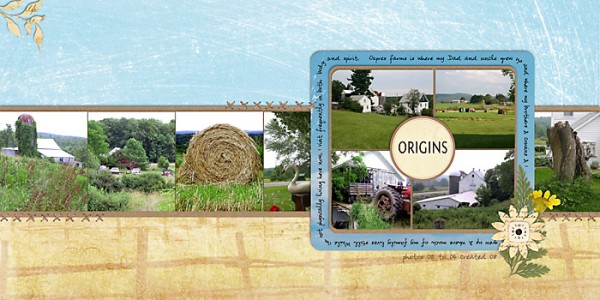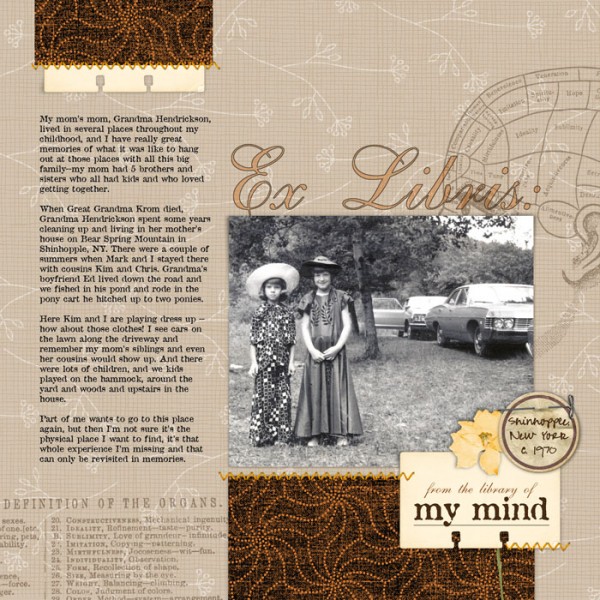consider yourself: where are you from?
Do you think of yourself as coming from a place, a people, or perhaps a culture? It’s probably a mix of all of these things, the combination of DNA, experience, and the purposeful shaping that our elders impart.

“Origins” includes several photos of the land I grew up on.
- who are the people you’re from?
Think about the people you knew (parents, grandparents, extended family) as well as those you never met. Consider what traits, interests, an even physical qualities your immediate family didn’t share. Just who passed these on?In addition to family, you come out of the community in which you grew up. Take time to think about how things were done in the places you lived and how they’ve shaped your behavior and beliefs. - what are the places you’re from?
Move from the micro (your room, your house, your yard) to the macro (your neighborhood, your town, your greater communities, and even your country) and think about what those places have imparted to you — both good and bad. What physical details do you remember? Is there a reason those details come back to you? What did those places demand of you, teach you, and give you? - what cultures and traditions do you come from?
Are you a child of the city? Of the mesas? Of an ethnic community? Of a community defined by the work it does? To tease out details and trigger memories, brainstorm around both the small repetitions and the larger repetitions of your earlier life. When did you eat dinner and why? Was it related to family work schedules? Did religion affect how you ate? What happened on weekends? On holidays? What values did your family hold and where did they originate?
priming the engine: ask yourself this
Think about the following quote and then answer the questions that follow.
Home is a place you grow up wanting to leave, and grow old wanting to get back to. – John Ed Pearce
- What did you grow up wanting to leave?
- Why and what are some words that describe this aspect of home you wanted to leave?
- What will you grow old wanting to get back to?
- Why and what are some ways to describe this aspect of home?
- Are there layouts you do about each of these aspects?

My mom’s mom, Grandma Hendrickson, lived in several places throughout my childhood, and I have really great memories of what it was like to hang out at those places with all this big family--my mom had 5 brothers and sisters who all had kids and who loved getting together. * When Great Grandma Krom died, Grandma Hendrickson spent some years cleaning up and living in her mother’s house on Bear Spring Mountain in Shinhopple, NY. There were a couple of summers when Mark and I stayed there with cousins Kim and Chris. Grandma’s boyfriend Ed lived down the road and we fished in his pond and rode in the pony cart he hitched up to two ponies. * Here Kim and I are playing dress up -- how about those clothes! I see cars on the lawn along the driveway and remember my mom’s siblings and even her cousins would show up. And there were lots of children, and we kids played on the hammock, around the yard and woods and upstairs in the house. * Part of me wants to go to this place again, but then I’m not sure it’s the physical place I want to find, it’s that whole experience I’m missing and that can only be revisited in memories.
think about it: quotations on origins
Use these quotes as a springboard to thinking about your origins.
- We cannot escape our origins, however hard we try – James Baldwin
- To forget one’s ancestors is to be a brook without a source, a tree without root – Chinese Proverb
- Nothing is so soothing to our self-esteem as to find our bad traits in our forebears. It seems to absolve us. – Van Wyck Brooks
- Home is a place you grow up wanting to leave, and grow old wanting to get back to. – John Ed Pearce
- We all grow up with the weight of history on us. Our ancestors dwell in the attics of our brains as they do in the spiraling chains of knowledge hidden in every cell of our bodies. – Shirley Abbott
- I have drunk deep of the waters of my ancestors. – Larry Neal
- Tradition means giving votes to the most obscure of all classes—our ancestors. It is the democracy of the dead. Tradition refuses to submit to the small and arrogant oligarchy of those who merely happen to be walking around. – Gilbert Keith Chesterton
- A man finds room in the few square inches of the face for the traits of all his ancestors; for the expression of all his history, and his wants. – – Ralph Waldo Emerson
- You can never go home again, but the truth is you can never leave home, so it’s all right. ~Maya Angelou
- I want to go home to the dull old town, with the shaded street, and the open square, and the hill, and the flats, and the house I love, and the paths I know – I want to go home” – Paul Kester
- We inherit from our ancestors gifts so often taken for granted. Each of us contains within this inheritance of soul. We are links between the ages, containing past and present expectations, sacred memories and future promise. – Edward Sellner
write it: journaling prompts / starters
I always wished I knew more about (insert ancestor) because _____
The room we spent the most time in at that house was _____
At family gatherings, we always ate _____
I still remember how (insert ancestor)’s home smelled . . .
Everyone says I look like _____
Everyone says I act like _____
The place I’d love to return to is _____
I was (insert ancestor’s name) favorite
My favorite season was _____ because _____
We all had chores growing up and mine was _____
The most unusal thing about visiting (insert ancestor’s name) was _____
On Sunday afternoons, we passed the time by _____
The dinner we most often ate was _____
The work my parents did was _____ and meant a lot of _____

